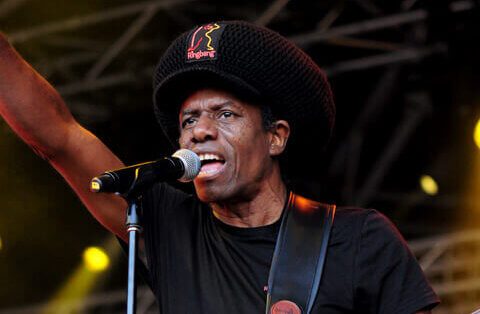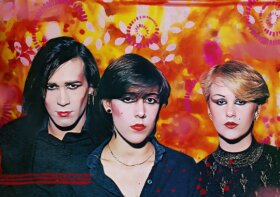What Happened to Eddy Grant?

Eddy Grant became an unlikely pop star in 1983. Somewhat of a one-hit wonder, Grant, 35, released his single “Electric Avenue,” a mix of reggae, funk and synth pop that managed to catch lightning in a bottle. It was a worldwide hit, reaching No. 2 in America. But he’s now just the answer to a 80s trivia question; he could never duplicate the success of “Electric Avenue.” So what happened?
Romancing another hit single
In 1984, Grant was asked to write and record the title song to the Michael Douglas/Kathleen Turner film Romancing the Stone. The song appeared only briefly in the movie, but it broke into the Top 10 in Canada and managed to make it to No. 26 in the U.S. But nothing he released after “Romancing the Stone” ever broke the Billboard Hot 100.
It wasn’t due to lack of trying. Grant released six albums between 1984 and 1993, but none yielded any high sales. His 1988 anti-apartheid single “Gimme Hope Jo’anna” was a No. 7 hit in the U.K., however.
Creating a new genre of music
After so many disappointments, Eddy Grant turned to producing. He created a recording studio called Blue Wave, named after a song from his 1984 album Going for Broke. Grant’s clients have included the Rolling Stones, Sting and Elvis Costello.
In 1994, he announced the creation of ringbang, a fusion of music genres including calypso, soca, reggae, dancehall, and other Afro-Caribbean rhythms He described it as a way to “envelop all the rhythms that have originated from Africa so that they become one, defying all geographical boundaries.” He hosted a concert in Tobago called Ringbang Celebration 2000, with featured artists from all over the Caribbean.
He has acquired many old calypso catalogs in an effort to preserve the genre and signed a number of soca and ringbang exponents. His record label, Ice Records, has offices in Barbados, London, and the United States and is one of the larger calypso, soca and ringbang record companies.
He has continued making music, releasing his most recent album, Plaisance, in 2017. During his career, Grant has experimented with different styles including pop, funk, new wave, reggae, Caribbean, African and even country.
He has been a staunch defender of artists’ rights, having been a vocal critic of streaming platforms such as Spotify and refusing his music on the apps as a protest for how little the artists get paid for their music. Recently, he sued Donald Trump and his campaign over the use of “Electric Avenue” during the 2020 presidential campaign. And he has even controlled the use of the term “ringbang” by other artists, filing a trademark for the word so that it could no longer be used by other artists without his permission.
Eddy Grant’s legacy
Grant may be remembered only for his droning one-chord hit “Electric Avenue” in the United States, but in his native country of Guyana, he is a hero. In 2016, he received a lifetime achievement award from the government of Guyana, which also issued a postage stamp featuring his likeness a decade earlier. And his legacy, ringbang, continues to be introduced to new generations of kids. “Retiring from music is not an option for me,” he told Express. “Even today my guitar is never any more than three feet away from me. It’s my life’s work.”
Sources:


